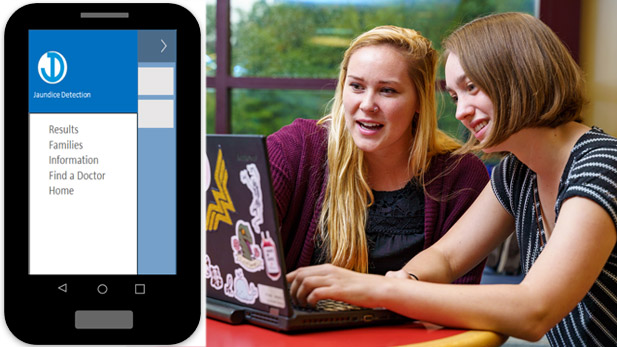Students’ Award-Winning App to Help Detect Jaundice in Infants

Engineering World Health organization leaders Megan Baker (left) and Dale Conrad demonstrate the award-winning mobile phone app developed by students to help detect jaundice through taking images of an infant eye.
A team of humanitarian-minded Rose-Hulman engineering students have combined their technical and problem-solving skills to develop a mobile phone app that can help detect jaundice in newborn infants–a significant health care issue in developing countries.
The campus’ Engineering World Health student organization earned third-place honors in the international organization’s student design competition. Group leaders also showcased the project to international educators attending the Biomedical Engineering Society’s annual meeting Oct. 17-20 in Atlanta.
Jaundice is a condition affecting about 60 percent of newborn infants and approximately 80 percent of premature-born infants, and if untreated can lead to brain damage or death. The problem is especially concerning in developing countries where nearly 70 percent of births occur inside homes, without skilled healthcare professionals to make proper diagnoses.
Common detection currently involves a painstaking blood test, requiring a hospital visit, or using a handheld device on the infant’s skin. However, this practice is challenging for infants with darker skin tones, and both methods are rather costly and therefore not used in economically challenged regions of the world.
That’s why 10 students from a variety of academic engineering majors undertook the program last spring, with assistance from computer science and software engineering students in an Android phone app development course.
Downloading the application will give people a free jaundice detector that can be used by simply taking a picture of the infant’s eye. A positive score would result in a recommended referral to a hospital or community health care facility for treatment; a negative result keeps a family from incurring expensive medical and travel costs for care.
“We wanted to develop something that had ease of use, was easy to understand and utilized technology that people were familiar with,” says senior biomedical engineering student Megan Baker, president of the Engineering World Health student chapter.
Joining in the project were current biomedical engineering students Hannah Bach, Dale Conrad, Kally Morozin and Steve Peterson, chemical engineering student Daniel Moore, biomedical engineering/mechanical engineering student Mandi Routon and software engineering student Ashlee Boyer. Alumni contributors were Ben Chang and Ben Katz. The chapter’s faculty advisor is Deborah Walter, associate professor of electrical and computer engineering.
Founded in 2017, the EWH chapter is a growing group of students who have assisted Indianapolis’ Fame Partnering in Medical Evangelism chapter in repairing medical surplus materials for use at health care facilities in need. Students also are planning for a trip to the Dominican Republic next spring to fix medical equipment in hospitals and community health care centers.
“There’s a common bond (among EWH members) of using our skills to help others,” says Conrad, who is hoping to attend medical school after graduation.
Baker wants to develop heart pacemakers after having summer internships in the medical device industry, while Moore is interested in developing polymers for a variety of uses, possibly in the medical industry.